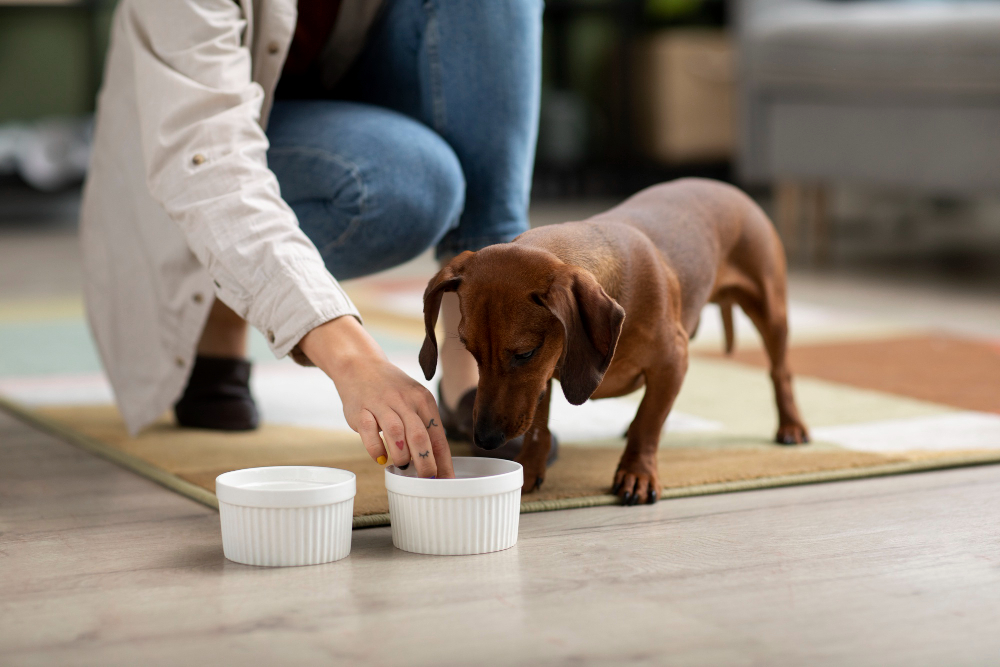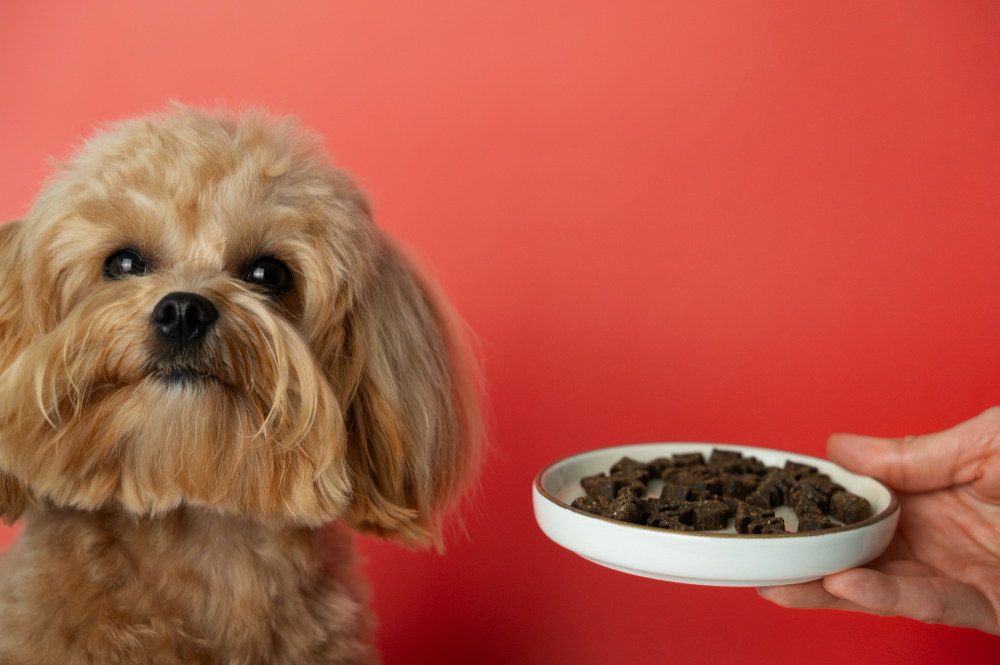A balanced diet is critical for growing puppies. Commercial puppy food offers a simple solution for meeting your puppy’s nutritional needs, but is it a requirement? Can puppies eat adult dog food and still develop properly?
You may find yourself asking this question for any number of reasons. Maybe you grabbed the adult version of your puppy’s regular food by mistake. Or you ran out of puppy food but have some adult dog food on hand. What should you do in situations like these?
We spoke to veterinary experts to find out. In this guide, you’ll learn whether you can feed puppies adult dog food and for how long. We’ll also cover the potential consequences of feeding your puppy an inappropriate diet.
Can Puppies Eat Adult Dog Food?
Yes, your puppy can eat adult food, but it’s not ideal long-term. In other words, there’s no need to panic if your puppy grabs a few bites from an adult dog’s bowl—but your puppy’s daily diet should really be formulated according to their specific needs.
According to Dr. Nell Ostermeier, DVM, CVA, FAAVA, a veterinarian and spokesperson for Figo Pet Insurance, “The ingredients in adult food are not harmful to puppies.” The other experts we spoke to agree that the ingredients in dog food aren’t usually the problem—it’s the formulation.
Dr. Sara Febbo, DVM, a veterinarian at Thrive Pet Healthcare, says, “The healthiest food for your puppy is one that provides complete nutrition and meets Association of American Feed Control Officials (AAFCO) pet food guidelines.”
There’s some risk of digestive upset when feeding your puppy adult dog food—especially if the recipe differs significantly from their usual diet—but a few meals shouldn’t cause any lasting harm. If the food meets AAFCO guidelines for all life stages, it shouldn’t be a problem at all.
“If the adult food is balanced for all life stages,” says Dr. Ostermeier, “you can actually feed it to your puppy long-term and it should not cause any negative effects.” When it isn’t, Dr. Ostermeier doesn’t recommend feeding it to your puppy for longer than a week.
Can my adult dog eat puppy food?
It depends. While adult dogs can eat puppy food, it may not be an appropriate long-term option. Puppy food is calorie-dense to support rapid growth. Those extra calories may put some adult dogs at risk for unhealthy weight gain.
Puppy food may also contain levels of certain nutrients in excess of what your adult dog actually needs. For example, puppies need extra calcium to support healthy bone development. However, excess calcium can contribute to skeletal abnormalities in adult dogs, and it may interfere with the absorption or utilization of other nutrients like phosphorus.
The experts we consulted agree that the best diet for any dog is one formulated for their life stage. Your veterinarian can help you determine whether your puppy or adult dog could also benefit from a recipe formulated for a specific breed size.

What Happens If Puppies Continue To Eat Adult Dog Food Over Time?
“Occasionally consuming adult dog kibble is not typically harmful to puppies,” says Dr. Febbo. However, she cautions against making a habit of it. Commercial puppy food contains specific levels of protein, fat, and essential nutrients to help your puppy develop properly and grow at an appropriate rate for their breed size.
According to AAFCO nutrient profiles, puppy food should contain a minimum of 22.5% crude protein and 8.5% crude fat, both measured as dry matter. Compare that to 18% protein and 5.5% fat as the dry-matter minimums for adult maintenance diets. Protein provides the amino acids needed to build healthy muscle, while fat offers a concentrated source of calories as energy to fuel rapid growth.
It’s not just that puppies need more protein and calories than adult dogs. They also need certain levels of specific micronutrients as well.
For example, calcium plays a key role in healthy bone growth in puppies. Without enough of it, your puppy could develop skeletal malformations. Conversely, high levels of dietary calcium can be detrimental to healthy bone development in large-breed puppies. Some adult dog food recipes might contain too much calcium for a large-breed puppy.
Puppy food should also contain a dry matter minimum of 0.05% combined eicosapentaenoic acid (EPA) and docosahexaenoic acid (DHA). These essential fatty acids support healthy brain, eye, and immune system development in growing puppies. AAFCO doesn’t specify minimums for these nutrients in adult dog food.
The health consequences of feeding your puppy an inappropriate diet may not become apparent immediately. However, Dr. Febbo says that inadequate nutrition in a puppy’s diet could result in stunted growth or developmental issues. If your puppy doesn’t develop properly, they could have a higher risk of musculoskeletal, neurological, gastrointestinal, or cardiovascular issues in adulthood. Poor diet may also impact your dog’s lifespan.
When to switch from puppy food to adult food
Puppy food is the best option for growing dogs, but how long do you wait to make the switch to an adult recipe? Again, it depends.
Wait to think about making the switch until your puppy’s rate of growth starts to taper off. Adult dog food is formulated to support healthy maintenance, so it just depends on when your puppy reaches their adult size. For small breeds it may happen as soon as 7-10 months, while it may take large and giant breeds 18-24 months to mature.
Your vet can help you estimate when your puppy will be full grown and when to switch their diet.
Alternatives To Giving Your Puppy Adult Dog Food
While there may be no immediate negative impact to giving your puppy adult dog food in a pinch, you have other options to consider. When you run out of dog food, you can always put together an emergency meal using dog-safe human foods.
When preparing temporary meals, Dr. Ostermeier recommends aiming for two parts protein and one part carbohydrate to ensure some degree of nutritional balance. For example, two cups of cooked chicken breast with one cup of steamed green beans might see your puppy through the day until you can make a run to the pet store.
The key is to prioritize human foods that aren’t just safe for your dog but are actually good for them. Choose lean proteins like poultry over red meat and whole grains or fresh vegetables over highly refined cereals or nutrient-limited starches.
Finally, if you find yourself with an extra bag of puppy food on hand, don’t let it go to waste! Donate it to a neighborhood pet food pantry or give it to a rescue. If you’ve already opened the bag, making a direct donation to a fellow dog parent might be your best bet.
